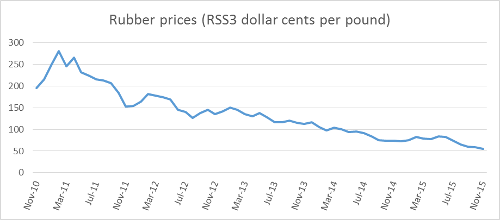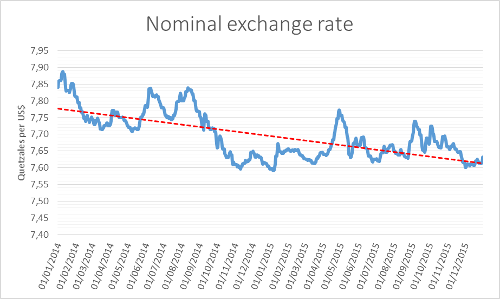Guatemala’s Minimum Wage Rise: The Perfect Storm for Exporters?

By Clynton R. López F. January 4, 2016
Translated from Spanish by Katarina Hall
On December 29, 2015 Alejandro Maldonado’s government announced a minimum wage increase of 4% for agricultural and non-agricultural activities and 3.5% for export and “maquila” activities. Even though the public sectors workers and unions are celebrating this wage increase—they believe any increase is not enough—the minimum wage increase could be damaging for the general economy, particularly for private sectors.
An example of the effects a minimum wage increase can have are commodity exporters, including sugar and rubber. Both commodities, which are important to the national economy, find themselves in an extended period of falling prices. Graph 1 shows the tendency of the international price for rubber since 2010.
Graph 1
With the commodities low international price, and Guatemala’s nominal exchange rate appreciation in recent years, the exporting sector of rubber and sugar has not been at its best. It is important to note that the international price of a commodity does not usually respond to inflation and its real price is usually low. As a result, it is necessary to permanently increment productivity to stay in business.
Graph 2
A moderate, but constant, appreciation of the nominal exchange rates can cause an extended and sharp fall in the international prices of export commodities. Additionally, if there is an increase in the minimum wage, the international situation of some commodities can trigger the collapse of marginal enterprises.
Did President Maldonado examine the aforementioned situations before decreeing this minimum wage increase? Is it possible for national enterprises to respond to the situation by increasing productivity levels? When we add the deterioration of Guatemalan highways and business extortions, among other factors, the answer is simple: Guatemalan export businesses have a difficult road ahead that is only made worse with the minimum wage raise.
Often, macroeconomic effects outshine the microeconomic ones. The macroeconomic stability of the country can overshadow the situation that Guatemalan industries might have to face. The effects of the minimum wage rise could be the tipping point for many businesses, generating a microeconomic effect of unemployment.
Get our free exclusive report on our unique methodology to predict recessions

Clynton López
Clynton López is a professor at the Francisco Marroquín University since 2002 in the areas of economics and philosophy. He has a degree in Economics with a specialization in Finance from the Francisco Marroquín University and a master in Economics from the same university, both Magna Cum Laude. He studied executive programs at Boston University on Managerial Economics & Corporate Finance, the Master of Philosophy at the Rafael Landívar University (specialization in phenomenology), and the Post Graduate Degree in INCAE for Senior Management. In the professional field he has more than 10 years of management experience in banking and financial companies in Guatemala, California and Puerto Rico, and is a member of the Mont Pelerin Society.
Get our free exclusive report on our unique methodology to predict recessions




